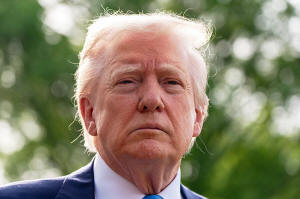Judge blocks Trump administration from nixing collective bargaining for
most federal employees
[April 26, 2025]
By MICHAEL KUNZELMAN
WASHINGTON (AP) — A federal judge on Friday temporarily blocked the
Trump administration from implementing an executive order that a labor
union says would cancel collective bargaining rights for hundreds of
thousands of federal employees.
U.S. District Judge Paul Friedman ruled that a key part of President
Donald Trump’s March 27 order can’t be enforced at roughly three dozen
agencies and departments where employees are represented by the National
Treasury Employees Union.
The union, which represents nearly 160,000 federal government employees
workers, sued to challenge Trump’s order. The union said it would lose
more than half of its revenue and over two-thirds of its membership if
the judge denied its request for a preliminary injunction.
Friedman said he would issue an opinion in several days to explain his
two-page order. The ruling isn't the final word in the lawsuit. He gave
the attorneys until May 2 to submit a proposal for how the case should
proceed.
Union president Doreen Greenwald said the judge's order is “a victory
for federal employees, their union rights and the American people they
serve.”
“The preliminary injunction granted at NTEU’s request means the
collective bargaining rights of federal employees will remain intact and
the administration’s unlawful agenda to silence the voices of federal
employees and dismantle unions is blocked,” Greenwald said in a
statement.
Some agencies, including the FBI, are exempt from a law requiring
federal agencies to bargain with labor organizations over employment
matters. Presidents can apply the exemption to agencies that have a
“primary function” of performing intelligence, counterintelligence,
investigative or national security work.
But no president before Trump tried to use the national security
exemption to exclude an entire cabinet-level agency from the law’s
requirements, according to the employees’ union. It said Trump’s order
is designed to facilitate mass firings and exact “political vengeance”
against federal unions opposed to his agenda.
“The President’s use of the Statute’s narrow national security exemption
to undo the bulk of the Statute’s coverage is plainly at odds with
Congress’s expressed intent,” union attorneys wrote.

[to top of second column]
|

President Donald Trump speaks with reporters as he and first lady
Melania Trump depart on Marine One from the South Lawn of the White
House, Friday, April 25, 2025, in Washington. The President and
first lady will be traveling to Rome and the Vatican to attend the
funeral for Pope Francis. (AP Photo/Alex Brandon)

Government lawyers argued that the court order requested by the
union would interfere with the president’s duty to ensure federal
workers are prepared to help protect national security.
“It is vital that agencies with a primary purpose of national
security are responsive and accountable to the American people.”
Justice Department attorneys wrote.
The IRS is the largest bargaining unit represented by the National
Treasury Employees Union. A day after Trump signed his order, the
administration sued a union chapter in Kentucky to seek a ruling
that it can terminate the collective bargaining agreement for the
IRS.
The union says the administration has “effectively conceded” that
its members don’t do national security work. The union members
affected by the executive order also include employees of the Health
and Human Services Department, the Energy Department, the
Environmental Protection Agency and the Federal Communications
Commission.
The union said it will lose approximately $25 million in dues
revenue over the next year. Some agencies, it says, already have
stopped deducting union dues from employees’ pay.
“In the absence of preliminary injunctive relief, NTEU may no longer
be able to exist in a manner that is meaningful to the federal
workers for whom it fights,” union lawyers wrote.
Government attorneys argued that the courts typically defer to the
president’s judgment on national security matters.
“Executive actions that are facially valid — that is, within the
lawful authority of the executive — are entitled to a presumption of
regularity,” they wrote.
All contents © copyright 2025 Associated Press. All rights reserved |